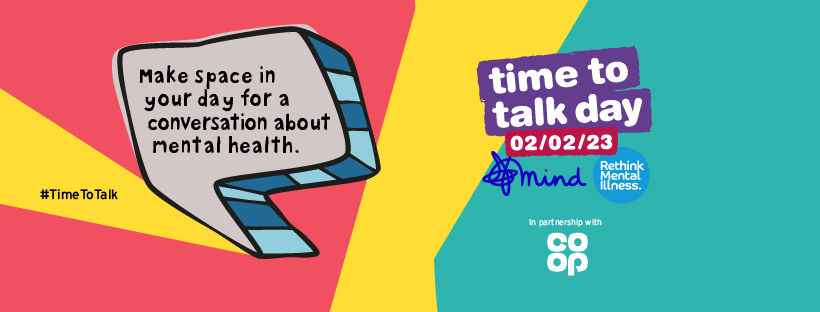Time To Talk day is the perfect opportunity to have conversations about mental health with your friends, family, classmates, teachers, colleagues and strangers!
What is Time To Talk Day?
Time To Talk Day is an awareness-raising event that takes place on the first Thursday of February every year. This year, that day falls on 3rd February.
The day happens all across the UK, but in Wales, it is delivered by Adferiad Recovery and Mind Cymru, two fantastic Welsh mental health charities.

Why is the day so important?
We all have mental health. Sometimes, we have good mental health whilst other times, we may struggle with our mental health. Did you know that 1 in 4 of us will experience mental health problems? By talking about it, we can support ourselves and others.
How to talk about mental health openly
It may be difficult at first to open up questions about mental health, but the more we do it, the easier it gets. Talking can really help to support people and remove the stigma associated with poor mental health. Here are some tips to get you started with having a conversation with someone about mental health:
1 – Think about the time and place
Some people prefer to talk in public spaces or whilst doing something else so the conversation feels more natural compared to sat in a quiet room alone. Just remember that if there’s too much going on, it may be a distraction.
It can also often be easier to open up to someone when sat side by side rather than face to face. Maybe you could have a conversation whilst sat on the bus, on a walk or when cooking.

2 – Ask open questions
Try to ask open questions instead of closed questions as this gives the person space to express how they’re feeling. A good way to think about closed questions are ones where a person can answer “yes” or “no”. These can make it harder to have a conversation with someone and doesn’t give them much room to explain how they feel. Instead, ask open questions such as “how does it affect you?” and “what does it feel like?”.

3 – Listen
As much as it is useful to guide the conversations through asking questions, it’s even more important to listen to what someone tells you. It’s very powerful to just be heard, so try your best to listen to what someone shares with you.
It can be hard to see someone you care about having a difficult time but try to resist the urge to offer quick fixes to what they’re going through. Learning to manage or recover from a mental health problem can be a long journey, and they’ve likely already considered lots of different tools and strategies. Just talking can be really powerful, so unless they’ve asked for advice directly, it might be best just to listen.

4 – Don’t try to fix it
When someone tells you what’s going on with them, it can be really tempting to try and fix the problem. The likelihood is that if someone is sharing a problem with you, they’re probably already thought of lots of different tools and strategies to help them. However, often it’s not that simple. Unless they ask for your advice, try to stop yourself from coming up with solutions and just listen.

5 – Be patient
It can take a long time for people to feel ready to open up and that’s okay. It’s still important to keep asking every so often to check in and that can make it easier for them to open up another time.

6 – Treat them the same
When semeone opens up to you, it’s important to to remember that they’re still the same person they were before. People want to be treated the same after they open up, so don’t treat them any differently.

Related Information
Read Lauren’s top tips about starting a conversation with someone about mental health.
Visit TheSprout’s mental health information page to check out support services for you or other young people that you care about.
Here’s some tip for the Meic advisors on how to approach a difficult conversation with a friend.
If you need to talk to someone, talk to Meic. Meic is the helpline service for children and young people up to the age of 25 in Wales. You can contact a Meic advisor for free who can listen to you non-judgementally and will help by giving you information, useful advice and the support you need.





